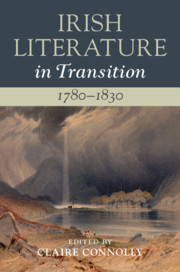Book contents
Introduction
Making Maps: Irish Literature in Transition, 1780–1830
Published online by Cambridge University Press: 28 February 2020
Summary
Between 1780 and 1830, a highly distinctive body of imaginative writing emerged in Ireland, formed by and in turn helping to mould the linguistic, political, historical, and geographical divisions characteristic of Irish life. The intense and turbulent creative effort involved bore witness to a key transition at the beginning of the nineteenth century: the emergence of modern Irish literature as a distinct cultural category. During these years, Irish literature came to consist of a recognisable body of work, which later generations could draw on, quote, anthologise, and debate. This chapter offers a new map of the making of Irish literature in the romantic period, as well as introducing the aims of the volume as a whole.
Keywords
- Type
- Chapter
- Information
- Irish Literature in Transition, 1780–1830 , pp. 1 - 34Publisher: Cambridge University PressPrint publication year: 2020

